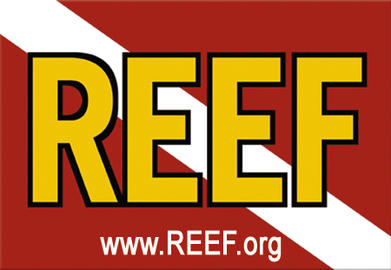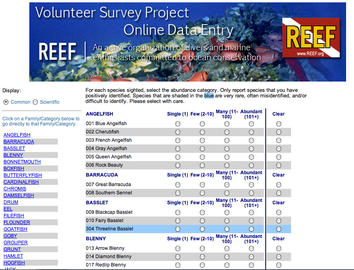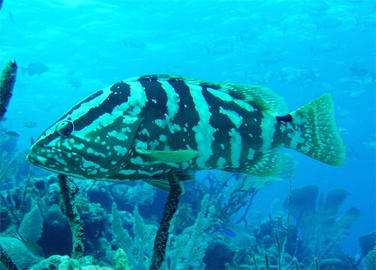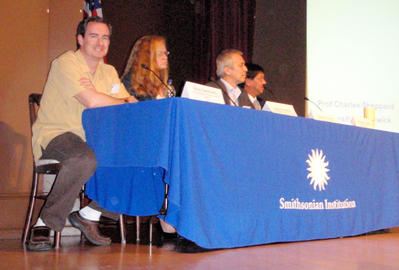Author: Lisa Mitchell, REEF Executive Director
REEF kicked off our summer fundraising campaign last week with a goal of raising $30,000 over the next 30 days. Help us meet this goal by contributing today! Although membership is free, REEF counts on financial support from individuals like you who believe in our work. Your donation will enable REEF to continue to support the Volunteer Survey Project and provide much needed data that will help to protect and preserve the underwater ecosystem. To find out more about the fundraising campaign and our plans for the next six months, read this special message from REEF Co-Founder, Paul Humann. Please take a moment to make a donation now using our secure online donation form at https://www.reef.org/contribute. Our capacity to successfully implement and grow ongoing programs is directly tied to your support. REEF can’t do it alone, and we thank you generously for your contribution!
Author: Christy Pattengill-Semmens, REEF Director of Science
We are excited to announce the launch of Online Data Entry 2.0. The new version includes several upgrades and now encompasses all of REEF's project regions. At long last, our REEF surveyors in the Tropical Eastern Pacific region (Baja Mexico - Galapagos Islands) and the Northeast US & Canada (Virginia - Newfoundland) are able to submit their survey data online. In addition, based on feedback from our members, the interface to add unlisted species has been greatly improved. Additional new features include: surveyors can now remain logged in for multiple submissions, ability to delete a survey in your queue, and the number of species entered is given on the summary page to cross-check with the survey paper. The Online Data Entry interface can be found at www.reef.org/dataentry. If you have feedback or suggestions you can send them to data@reef.org.
The online data entry interface allows volunteers to log on to the REEF Website and complete data entry, either during one or multiple sessions, and includes a variety of error checking features. Submissions of Volunteer Survey Project data through the online interface is becoming the preferred method among our volunteers, due to the quick turnaround in processing (typically posted to their personal survey log report within 2 weeks versus 10 weeks) as well as the time and money savings for the volunteer. Similarly, REEF strongly encourages online submission due to the higher quality of data that are submitted (the program eliminates clerical errors and missing data, and requires surveyors to verify questionable sightings), as well as the comparably minimal staff and natural resources that are required to process the survey data. Paper scanforms will still be available and will continue to be accepted.
If you are new to entering REEF data online, check out these instructions and this past enews article on data entry tips. Most notably:
In order to submit a survey from a location, REEF must have an 8-digit zone code for the site in our database first. Existing zone codes are listed at http://www.reef.org/db/zonecodes. To have a zone code assigned for a new site, please contact us at data@reef.org.
REEF first launched online data entry for the Tropical Western Atlantic region in 2005. To date, over 15,000 REEF surveys have been submitted online. REEF is beginning work on developing an offline entry program that will enable surveyors to electronically capture data offline and later submit the survey information through the existing REEF online data entry interface. Stay tuned for updates.
We would like to extend a very big thank you to Michael Coyne for all of his work on the new Online Data Entry interface. His assistance and support through the years is much appreciated!
Author: Christy Pattengill-Semmens, REEF Director of Science
Data collected as part of the REEF Volunteer Survey Project were the basis of a recent publication evaluating the effect of human population size on coral reef fish populations. The sweeping study, conducted by researcher Dr. Chris Stallings of Florida State University Coastal and Marine Laboratory, revealed that sharks, barracuda and other large predatory fishes disappear on Caribbean coral reefs as human populations rise, endangering the region’s marine food web and ultimately its reefs and fisheries. The study, which used data collected by REEF volunteers at sites in 22 Caribbean nations over 15 years, demonstrates the power of volunteer and community research efforts by non-scientists. Data are often insufficient at region-wide scales to assess the effects of extraction in coral reef ecosystems of developing nations. The REEF citizen science project fills this gap by generating valid and needed data over large geographic areas over long time periods.
While other scientists working in the Caribbean have observed the declines of large predators for decades, the comprehensive work by Dr. Stallings documents the ominous patterns in far more detail at a much greater geographic scale than any other research to date. The study found that nations with more people have reefs with far fewer large fish because as the number of people increases, so does demand for seafood. Stallings said that although several factors -- including loss of coral reef habitats -- contributed to the general patterns, careful examination of the data suggests overfishing as the most likely reason for the disappearance of large predatory fishes across the region. He pointed to the Nassau grouper as a prime example. Once abundant throughout the Caribbean, Nassau grouper have virtually disappeared from many Caribbean nearshore areas and are endangered throughout their range.
Dr. Stalling's article on the study, “Fishery-Independent Data Reveal Negative Effect of Human Population Density on Caribbean Predatory Fish Communities,” was published in the May 6, 2009 issue of the journal PLoS One. The paper is available for download here.
To find out more about how REEF Volunteer Survey Project data have been used by scientists and government agencies, visit the Publications page on the REEF Website.
Author: Lad Akins, REEF Director of Special Projects
The USS Hoyt Vandenberg is the most recent ship to be placed as an artificial reef in the waters off Key West, Florida. The ship was sunk on May 27, 2009, but three weeks prior to the sinking the REEF team was in action conducting surveys of the sinking site and 7 other adjacent sites for comparison. The data will be used by the State of Florida to document fish recruitment onto the wreck and response of nearby reef sites to the new structure. In addition to regular REEF fish surveys, the team is also gathering important fish biomass data at two sites and recording any observations of non-native titan acorn barnacles, orange cup corals or non-native fish including lionfish.
The pre-deployment surveys at the sinking site did not document any fish present at the sandy bottom site though one barracuda was seen swimming through the area shortly after. Combined data from the 7 reference sites documented 159 species including rare sightings of pugjaw wormfish and cherubfish (rare for the Keys). The summary of data can be found here.
REEF will continue regular monitoring of the Vandenberg and reference sites through next summer, with a final report due by the end of 2010. A huge thank you to all of the REEF experts joining in on the effort including Rob McCall, Tracy Harris, Dave Grenda, Brenda Hitt, Jamie Giganti, Lisa Canty and Pat Zuloaga.
Author: REEF Staff
REEF's Grouper Moon Project Featured as "Success Story in Marine Conservation" REEF's research program focused on studying one of the last remaining large spawning aggregations of Nassau grouper in the Cayman Islands, the Grouper Moon Project, was included as one of 26 stories of good news in the typically grim news of marine conservation efforts. Dr. Brice Semmens, Grouper Moon Project lead scientist, presented results from the collaborative research efforts during the Beyond the Obituaries: Success Stories in Ocean Conservation symposium organized by Drs. Jeremy Jackson and Nancy Knowlton at the National Museum of Natural History last month. To watch Brice's talk archived online, click on this link and then navigate to about 52:45 on the time bar. The presentation is 10 minutes.
REEF Featured on NPR's Morning Edition REEF surveyor, Pacific NW diver, and NPR reporter Ann Dornfeld wrote and narrated a story that aired on National Public Radio on May 20th. The story covers a typical REEF survey, as well as discussing how the data is being used in Washington State to help understand the status of rockfish species. The story features interviews with REEF surveyors Janna Nichols and David Jennings, REEF's Director of Science - Christy Semmens, and WDFW's Greg Bargmann. Click here to listen to the story or visit KUOW webpage to read the transcript.
New Hawaii Field Guides Added to the REEF Online Store We have just added three new field guide books for critters and fish found on Hawaii's reefs. The new selection includes an updated and expanded fish guide by John Hoover, which is a must for any diver or snorkeler planning to do surveys in Hawaii. We also added Hoover's Hawaii's Sea Creatures, a guide to over 500 invertebrate species, and a waterproof booklet of 100 of the most common Hawaii fishes. Visit the REEF Store today for all of your field guide needs, as well as your place for REEF survey materials and REEF gear!
REEF To Collaborate On Assessment of Coral Reefs REEF will be providing fish population data to Reefs at Risk Revisited, a global analysis of threats to coral reefs using high-resolution data and biological modeling. The Reefs at Risk project is led by the World Resources Institute (WRI) and the International Coral Reef Action Network (ICRAN), and will serve as a landmark evaluation of coral reefs worldwide. Stay tuned for future issues of REEF-in-Brief for updates.
Great Annual Fish Count 2009 An exciting lineup of free identification seminars and survey dives are being organized around the country by REEF partners. Check out the GAFC Website for more details and to find out how to organize your own GAFC event. And be sure to watch the GAFC calendar of events to see what's being planned in your area.
Please Remember to Donate During REEF's Summer Fundraising Campaign Your support is needed to ensure the long-term success of REEF and our important marine conservation programs. Donate online today through this link. On behalf of the Board of Trustees and Staff -- Thank You!









